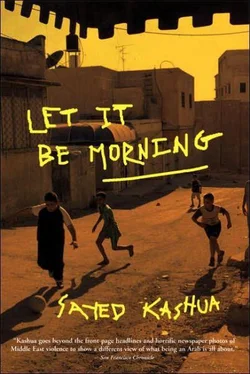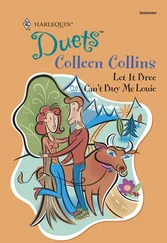My little girl has fallen asleep and I put her down on my parents’ bed, the one they bought on their wedding day more than thirty years ago, the one they still sleep in. I go home, get the car keys and get in the car to listen to the news. The heat is overpowering, and it isn’t even noon. The radio dials are boiling. I try to turn them without getting burned, and pull away quickly. They’re playing the commercials now, the ones that come right before the news. Advertising air conditioners, savings plans at the bank and special deals on trips abroad or at local resorts. The news begins with an announcement that the government, in cooperation with the army, has decided to declare a general state of emergency. Officials in the security system are talking of the imminent danger of an Arab uprising and about red alerts related to certain people in the Arab sector who are planning to attack Jewish citizens and state institutions. Later, toward the middle of the newscast, they mention our village. The announcer reports an attempt to attack some soldiers who were conducting a routine patrol near the entrance to the village. “An attempted terrorist attack,” he says, “which ended without casualties thanks to our soldiers’ alertness.” He’s referring to the incident with the contractor and the worker in the pickup. Needless to say, there’s no mention of the Arab casualties, and it stands to reason they don’t have the facts anyway. There’s no way of communicating with people in the village, after all.
The situation has become unbearable. They’re up to something, it’s obvious by now, and they’re laying the foundations in Jewish public opinion. For two years now, politicians, ministers, members of Knesset and security experts have been talking about a “cancer in the heart of the nation,” an “imminent danger,” a “fifth column,” and a “demographic problem that threatens to undermine the Jewish fiber of the state.” What do they expect? What the hell do they expect? The Jewish public is already filled with hatred and a sense of danger. Just how far do they expect it to go? I look for the Arabic news on Voice of Israel. I know it’s the government propaganda channel — still, maybe they’ll give some more information — but their frequency has been cut too.
There’s a loud noise coming from the street, and I run back to see what’s happening. My younger brother is standing outside watching. It’s the funeral, judging by the noise, the largest funeral there’s ever been in this village. We can’t see it, but the cries of “Allahu akbar” reverberate through the village. A few women come out of their houses all excited and watch the funeral procession. They must have taken the bodies out of the mosque by now. My wife returns home and tells me that the high school kids came to the elementary school, entered each of the classrooms and announced a general strike and a demonstration. “I hope the younger ones go home and don’t get into trouble now, that’s all they need,” she says.
“I’m glad you’re back,” I tell her. “The baby’s fallen asleep and I’m going out to see what’s happening.”
“What for? What can you do to help?”
“It’s not for me, it’s part of my job,” I say, and feel the rush of the adrenaline that used to course through my veins when I set out to do a story.
“If things heat up, come back right away, do me a favor. Don’t be late, okay?” my wife says, and it reminds me of the days when I used to cover stories on the West Bank and it worried her. How I’ve missed her worrying.
The cemetery is teeming with people. Everyone is silent, allowing the prayer for the dead to be conducted peacefully. As soon as it’s over, the crowd cries out, “Allahu akbar,” and continues walking. Almost nobody goes home after the burial. The funeral has turned into a demonstration, possibly the largest the village has ever seen. A village that kept out of trouble even on Land Day and in the October events because it knew where its interests lay. The demonstration is being led by high school students repeating slogans they’ve heard from the Palestinians on TV. “With blood and might we shall redeem you, ya shahid .” They’d decided that the contractor and his two workers were shahids. The students march toward the council building. Some climb up on the roof, pull down the Israeli flag and burn it. The demonstrators whistle and boo and call out slogans against the State of Israel and against the prime minister — Swine, the Murderous Dog.
Very soon activists from the Islamic Movement join in, equipped with a pickup with loudspeakers and green party flags. Mostly they’re thinking of the political capital they can get out of it, and so are the Communists, who are waving red flags and singing their slogans and calling out the names of their leaders. The pan-Arabists are not far behind, with their yellow banners and the pictures of their leader stuck onto construction-paper placards. They all join a single procession at first, and call out the same slogans against the army and in support of the shahids . Very slowly the groups drift apart. The Islamic Movement activists lead the way, followed by the pan-Arabists, then the Communists, each group shouting different slogans, and then come the masses of demonstrators, ordinary people who’ve come for the funeral and decided to join in, to unleash their anger, show their solidarity and maybe do something to alleviate the grief of the bereaved families.
The demonstrators are marching through the village, and people keep joining them. Women take their place at the end of the procession, careful not to come too close to the men. The more neighborhoods they go through, the more demonstrators there are. Their faces are more angry than concerned. The shops, the offices and the restaurants close as a sign of mourning. It isn’t a strike. The demonstrators are making their way toward the exit from the village, toward the roadblock. I take my place in the rear, as close to the women as possible. I’m not taking any chances. If they fired this morning, they might fire now too.
The mayor and a large group of his young relatives are there, with their backs to the barbed-wire fence, waiting for the demonstrators, signaling them from a distance not to go any closer to the makeshift fence. The mayor hasn’t a chance of keeping them away. If the demonstrators were inclined to come closer, he couldn’t stop them. It just hasn’t occurred to them. Nobody’s willing to run the risk, and the procession draws to a halt at the roadblock. The demonstrators are shouting their tried and true slogans into their megaphones. The Muslims are shouting “Allahu akbar,” and “Khaybar khaybar, ya Yahud,” and that the Army of Muhammad will soon be back. The Communists are singing songs of solidarity and support of the Communist Youth Movement and the pan-Arabists are praising Nasser. Gradually the demonstrators begin to disperse, and soon there is nobody left facing the roadblock. In the distance, the soldiers can be seen getting up and putting down their weapons.
The atmosphere in the village has changed. More and more people are worried. The grocery stores, the bakeries and the restaurants that reopened after the demonstration have never seen so many shoppers. The stores were more crowded than on a Saturday before the Intifada, when Jews used to arrive from all around Israel.
There are one or two grocery stores in each neighborhood, a total of fifteen in the village as a whole. At the entrance, very close to the roadblocks, are the larger stores, for people arriving from the outside. The owners of those outlets used to be considered very lucky. Many Jews preferred shopping in the village, because they were sure the Arabs charged less, which wasn’t really true. The fact is that most of the villagers actually shopped in the city and saved quite a bit.
Читать дальше












